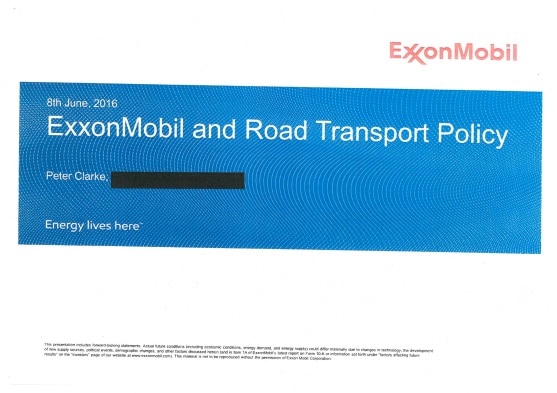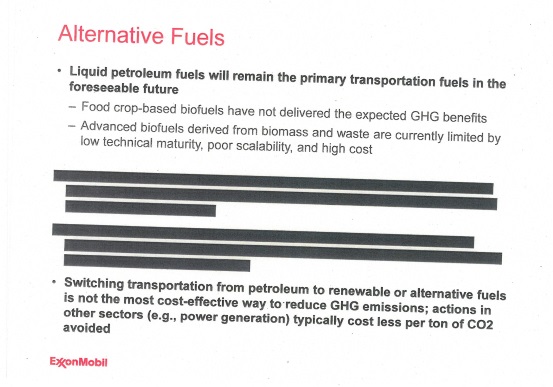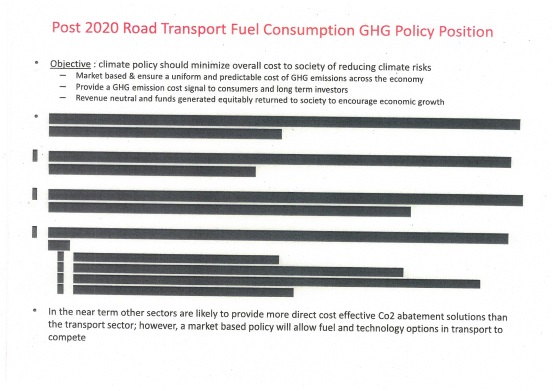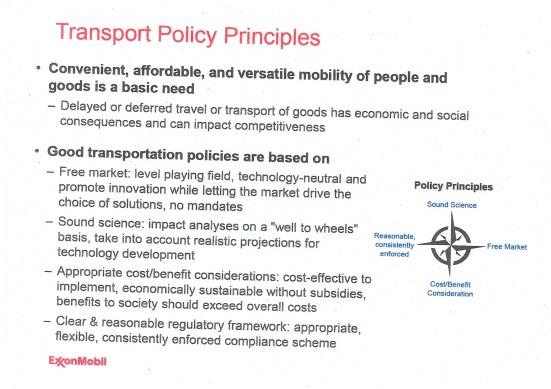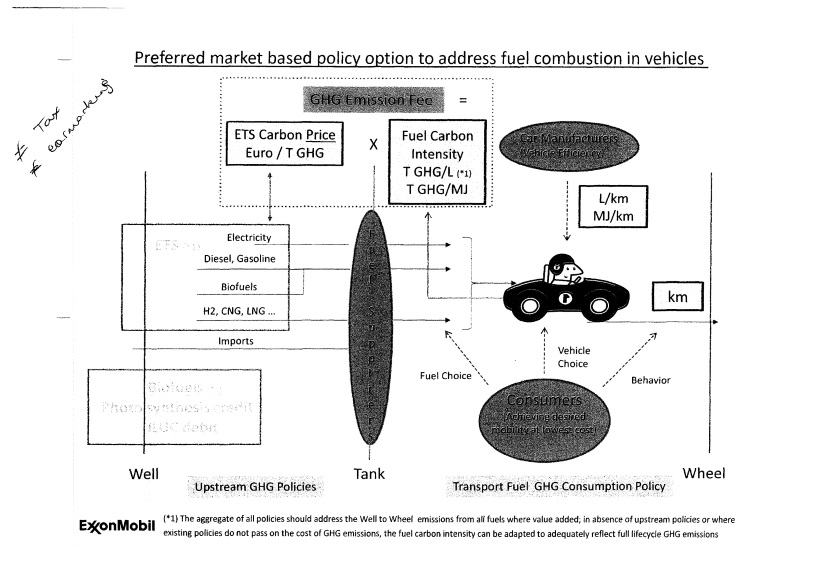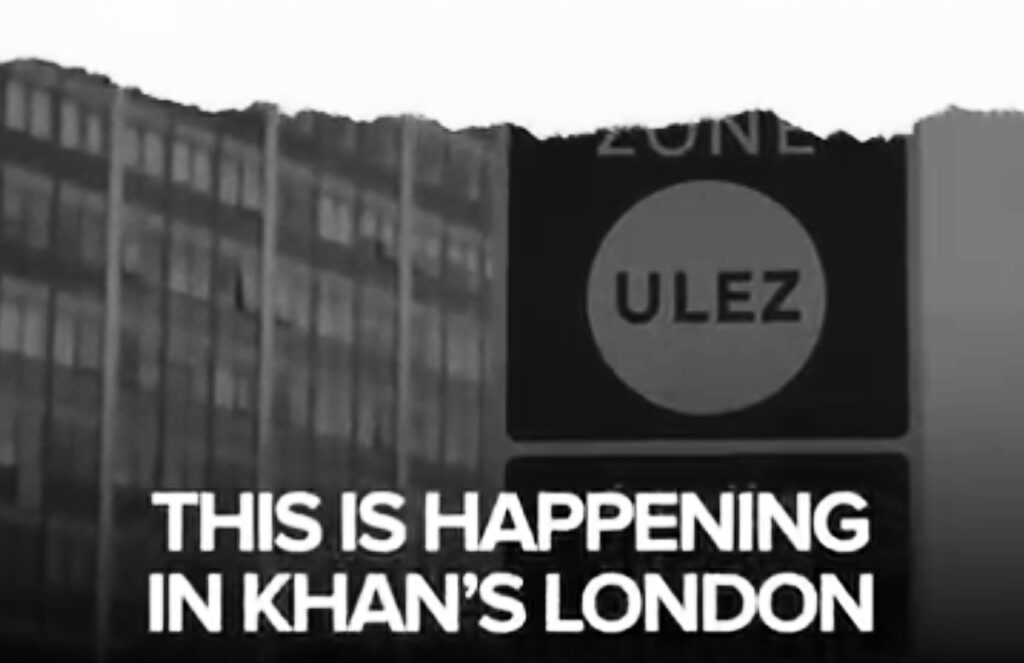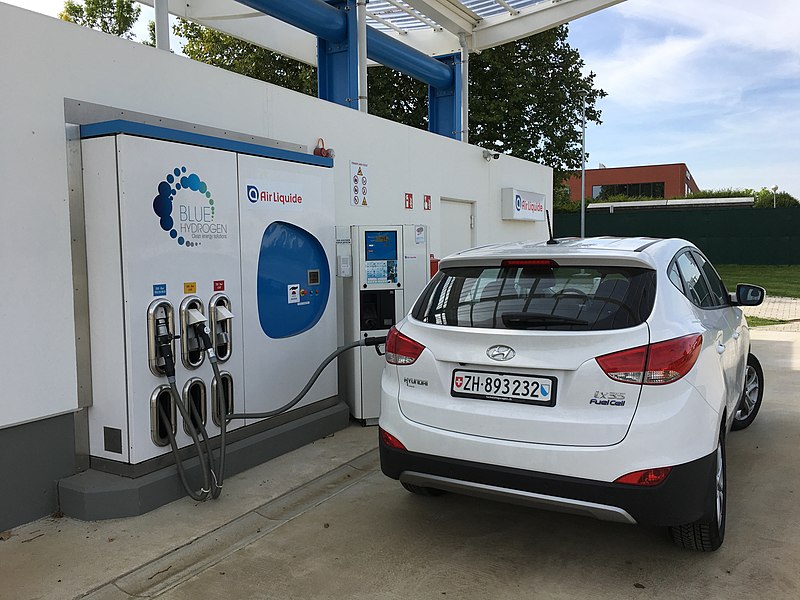“Switching transportation from petroleum to renewable or alternative fuels is not the most cost-effective way to reduce GHG [greenhouse gas] emissions.”
This is the message that ExxonMobil has delivered to the UK Department for Transport (DfT) in three separate presentations since the Paris climate deal was agreed last December, reveal documents obtained by DeSmog UK.
Exxon appears to be the only major fossil fuel company currently heavily lobbying the British government against greener transport policies, according to the DfT’s response to DeSmog UK’s Freedom of Information (FOI) request.
The presentations by Exxon and correspondence between Peter Clarke, a director at Exxon, and the Department Secretary Patrick McLoughlin show the oil giant lobbying on biofuels, transport and carbon reduction, and the Fuels Quality Directive – all policy issues that impact the decarbonisation of our transport system and up-take of electric vehicles.
The document release comes as the government’s environmental audit committee warned the UK is “falling behind” on its electric vehicle targets.
The committee criticised ministers for failing to implement the proper incentives and infrastructure needed to encourage the growth of the sector. Increasing the number of electric vehicles is critical if the UK is to tackle both climate change and harmful air pollution.
In order to meet the UK‘s 2050 climate change targets, 60 percent of new cars and vans need to be electric by 2030 according to analysis by the Committee on Climate Change.
Transport Policy
As slides from a January 2016 presentation by Exxon to the DfT read: “Liquid petroleum fuels will remain the primary transportation fuels.”
Biofuels “have not delivered the expected GHG benefits” and battery electric vehicles and fuel cells cars are not “commercially viable at a large scale,” Exxon argues.
The company concludes: “In the near term other sectors are likely to provide more direct cost effective CO2 abatement solutions than the transport sector.”
Some information has been redacted from the documents or withheld by government for the following given reasons: It is related to the formulation of air quality and decarbonisation policy still under development; it is confidential commercial or industrial information; it is copyrighted material.
Exxon repeated the arguments that electric vehicles and alternative fuels aren’t in our near future, and won’t help reduce emissions, in March and June when the company met with the DfT to discuss road transport policy and the Alternative Fuels Infrastructure Directive (AFID).
As the documents describe, the AFID “seeks to establish a common framework of measures for the deployment of alternative fuels infrastructure in order to minimise oil dependence, mitigate the environmental impact of transport and provide long-term stability for private investments”.
In response to the AFID’s objectives, on 8 June, Exxon argued that “Transport fuel policy should be limited to covering emissions from fuel combustion vehicles”.
In other words, the government shouldn’t set policy requirements for alternative fuels, support for electric vehicle recharging, or refuelling points for natural gas or hydrogen – all things AFID seeks to do.
Oil Industry vs EVs
As Exxon’s private meetings with the DfT show, behind the scenes lobbying to dampen the prospects of electric vehicles is growing. And Exxon isn’t the only company that’s worried.
Both Exxon and OPEC have publically down-played the threat electric vehicles pose to their business models.
In 2015, Shell also met with the DfT to discuss the role of hydrogen in the decarbonisation of transport, the same series of documents obtained by DeSmog UK shows. A separate meeting between the DFT and the oil industry (including Exxon, Shell and BP) was also held to discuss the future of biofuels.
Meanwhile, in the United States, a Koch Industries-backed campaign to rebrand fossil fuels called Feuling U.S. Forward was recently launched to undermine clean energy innovations including electric vehicles.
And last month a report sponsored by the American Petroleum Institute was released claiming that biofuels are worse for the climate than gasoline.
Why is the oil industry so afraid? Because, as the Financial Times reported at the end of August, the total number of electric vehicles on the road around the world has grown a staggering amount in the past seven years – from less than 6,000 in 2009 to 1.2 million last year.
In the UK, the number of electric vehicles on the road is around 80,000, up from 2,000 just five years ago.
Analysts at Bloomberg New Energy Finance expect that by 2040 electric vehicles may make up a quarter of the world’s car fleet. This would lead to a 14 percent drop in oil demand. They also expect electric vehicles to be cheaper than conventional cars by 2022, assuming the price of oil recovers to around $60.
As Michael Wojciechowski, a Houston-based oil analyst at energy consultancy Wood Mackenzie, told the FT: “Everybody is paying attention … This thing has the potential to really start to take off.”
‘Sound Science’
So what does Exxon want instead? Transport policies should be based on “sound science” says Exxon – a phrase long invoked by the tobacco industry and climate science deniers when lobbying against policies that challenge the status quo. The phrase puts an extremely high burden of proof on those arguing for change (normally the government) before taking action, effectively serving to limit industry regulation.
Presentations to the DfT explain that, according to Exxon, “good transport policies” are based on free-market principles, cost-benefit analysis, and a “clear & reasonable regulatory framework”.
This means there should be no government mandates, technology should be cost-effective and “economically sustainable without subsidies” and the “benefits to society should exceed overall costs,” the oil giant argues.
As Exxon’s presentation explains, policy decisions should be based on a “well to wheels” analysis.
While the documents obtained from the DfT do not show what this would look like, Exxon delivered a very similar presentation to the European Commission last year which DeSmog UK also received via FOI.
This contains a diagram depicting the various considerations that Exxon says should be undertaken in a “well to wheels” analysis.
Well to wheels analysis often comes up when raising the question of whether electric cars are actually environmentally friendly if the electricity used is generated from polluting sources and the car’s manufacturing process also releases emissions.
However, this is comparing apples and oranges. Exxon is keen on well to wheels analyses because while electric cars are in their infancy, it makes petrol cars look preferable – some short term emission savings will indeed come from more efficient petrol and diesel cars.
But in emphasising this type of analysis, Exxon is denying the direction of travel: towards a low carbon electricity grid, more efficient electric vehicle production, and ultimately a clean transport sector.
You can access all the documents detailing Exxon’s lobbying on electric vehicles in the UK and EU via the links below:
Department for Transport DeSmogUK FOI Response 1
Department for Transport DeSmogUK FOI Response 2
Department for Transport DeSmogUK FOI Response 3
EU Commission DeSmog UK Access to Documents Response 1
EU Commission DeSmog UK Access to Documents Response 2
EU Commission DeSmog UK Access to Documents Response 3
Subscribe to our newsletter
Stay up to date with DeSmog news and alerts


